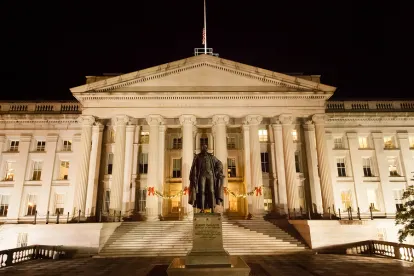On October 18, 2021, the U.S. Department of the Treasury (“Treasury”) released the findings from its review of the economic sanctions administered and enforced by its Office of Foreign Assets Control (“OFAC”). During the review, Treasury met with individuals representing hundreds of sanctions stakeholders, including Members of Congress and their staffs, the private sector, foreign governments, and Treasury’s sanctions workforce. The review—headed by Deputy Secretary of the Treasury Wally Adeyemo—focused on two primary issues: (1) the framework guiding the imposition of U.S. sanctions; and (2) potential operational, structural, and procedural changes to improve Treasury’s ability to use sanctions now and in the future. The report and its recommendations aim to preserve the efficacy of U.S. sanctions in confronting perceived foreign policy and national security threats to the U.S. by “modernizing” their implementation through:
-
Adoption of a structured policy framework that links sanctions to a clear policy objective;
-
Multilateral coordination wherever possible;
-
Calibration of sanctions to mitigate unintended economic, political, and humanitarian impact;
-
Ensuring sanctions are easily understood, enforceable, and, where possible, reversible; and
-
Investment in modernizing Treasury’s sanctions technology, workforce, and infrastructure.
These recommendations generally are consistent with long-standing U.S. policy. For example, with respect to the adoption of a policy framework and reversal of sanctions, then-Acting Under Secretary Adam Szubin explained at the 2016 Project Global Conference:
We don’t use sanctions to vent frustration. We don’t use sanctions to levy punishment for past misconduct, and we don’t use them without a clear policy objective in mind.
We use sanctions to disrupt illicit activity, and to help change the strategic calculus of our adversaries. Like diplomacy, they are a means to an end, not an end in themselves.
Accordingly, when we impose sanctions, we must clearly articulate what behavior needs to change, and be ready to make good on relieving sanctions when we achieve our ends.
Treasury also has long maintained a well-established preference for multilateral coordination. During his tenure as OFAC Director, Mr. Szubin provided testimony to the House Foreign Affairs Committee in 2007 clearly articulating this point:
Because our tools [economic sanctions] are aimed at isolating our targets, we are most effective when we proceed multilaterally, either with a coalition or with the consensus of the United Nations. We work closely with the State Department and with our fellow finance ministries and central banks abroad to build consensus on financial measures.
Concerns regarding diminishing effectiveness of U.S. sanctions
In addition to the recommendations referenced above, the report emphasizes the threat to the effectiveness of U.S. sanctions posed by a reduction of U.S. dollar-denominated international transactions through the rise of digital assets and alternative payment systems. As the report explains, “American adversaries—and some allies—are already reducing their use of the U.S. dollar and their exposure to the U.S. financial system more broadly in cross-border transactions.”
The reduced role of the U.S. dollar has long been a concern for Treasury. In 2016, Secretary Jack Lew provided remarks at the Carnegie Endowment for International Peace regarding this issue:
The risk that sanctions overreach will ultimately drive business activity from the U.S. financial system could become more acute if alternatives to the United States as a center of financial activity, and to the U.S. dollar as the world’s preeminent reserve currency, assume a larger role in the global financial system. Global norms are hard to reshape, existing alternatives are not well positioned to fully fill the role of U.S. markets and the U.S. dollar, and there are many factors that will continue to make the United States the most attractive financial system in the world. But our central role must not be taken for granted.
Secretary Lew’s remarks were prescient. Five years later, foreign adversaries are promoting efforts to develop alternative payment systems outside the traditional dollar-based financial system. China is working towards developing the digital Yuan to insulate the country from U.S. sanctions. Similarly, Russia has been working to develop currency and blockchain-based solutions that would serve as an alternative to the SWIFT payment system. Deputy Secretary Adeyemo acknowledged the threats posed by adversaries and stressed that Treasury must act in unison with other countries in responding to these evasion efforts. He added that by engaging international allies and partners, the U.S. will be able to hold its adversaries accountable for actions taken in violation of international laws and norms.
Warning to the Digital Asset Industry
The first three Treasury recommendations, and its continued concern about diminishing effectiveness, represent the status quo, while the fourth and fifth recommendations are particularly noteworthy as applied to the digital asset industry.
First, the report calls for Treasury to invest in enhancing its technology and workforce capabilities related to digital assets and services “to support the full sanctions lifecycle of activities.” Deputy Secretary Adeyemo emphasized this point at a Senate Banking Committee hearing following the report’s release when he requested additional funding for OFAC to manage the increasingly complex sanctions landscape amid ever-evolving threats from cybercriminals, ransomware, and others. This would significantly increase OFAC’s already intense focus on virtual currency and related services. Crypto experts staffed throughout the Targeting, Licensing, Compliance, and Enforcement divisions would both enhance OFAC’s capacity to address the threats and maximize the investigative possibilities inherent in that industry’s products and services.
Second, the report recommends that Treasury more effectively communicate and coordinate with the private sector generally and particularly with the crypto industry. While that should be a welcome development to crypto-related organizations with robust compliance programs, the entities with developing capabilities should take notice that this signals likely increasing compliance expectations. Based on our experience working at OFAC and representing clients in front of the agency, we expect OFAC to communicate its evolving compliance expectations during these outreach sessions while benchmarking against best-in-class compliance programs. OFAC will expect companies to internalize these expectations and adapt their compliance programs accordingly.





 />i
/>i

